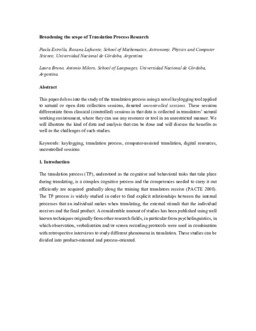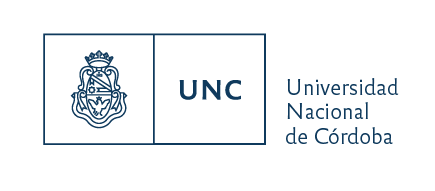| dc.contributor.author | Estrella, Paula | |
| dc.contributor.author | Lafuente, Roxana | |
| dc.contributor.author | Bruno, Laura | |
| dc.contributor.author | Miloro, Antonio | |
| dc.date.accessioned | 2022-09-26T19:54:15Z | |
| dc.date.available | 2022-09-26T19:54:15Z | |
| dc.date.issued | 2018 | |
| dc.identifier.uri | http://hdl.handle.net/11086/28618 | |
| dc.description.abstract | The competencies needed to translate efficiently are acquired gradually along the academic path and are usually supported by the use of a wide range of tools and resources, such as onlinedictionaries, translation memories, corpus analysis tools, etc (PACTE, 2008). Moreover, cognitive and behavioral tasks are also a key component within ahighly complex process known as translation process. Many researchers on translation have focused on product-oriented or process-oriented research in order to study how translators process the source text and produce the corresponding target text. More recently, with the ease of access to new technologies and computing power, process-oriented research has benefited from new methodologies that require massive data collection and analysis. One of the widely used methods tostudy the translation process is keylogging, the action of recording keyboard andmouse activity in a computer through the use of keystroke logging software. It may also record keyboard event timestamps and periods of inactivity (pauses) during a translation session. The main advantage of using these tools is that qualitative methods can be complemented with objective data analyzed quantitatively, adding robustness to translation studies. Keyloggers were developed in the 90's, and since then, several tools of the type have been created; however, the most used ones are InputLog (Leijten, 2005) and Translog (Carl, 2012). Both provide several functionalities to collect data including audio information (for think-aloud and verbal protocols) and to analyze data (e.g. plug-ins for Microsoft Word or offline reconstruction of translations). In the case of Translog, it also allows the use of eye trackers. As regards their limitations, these mainlylie in the fact that both keyloggers can only be installed on a Windows platform. This often makes their use impossible in settings such as ours inwhich lab computers run Linux. It was this disadvantage that motivated the development of Research Logger (Lafuente, 2015), an adaptation of an existing keylogger into a portable open-source software which logs detailed data (e.g.keystrokes and clicks) occurring in every open application window. Although it is still under development, it has already proven useful in two different types of studies: controlled sessions and uncontrolled sessions. The former have arigorous experimental design for studying directionality in English-Spanish translations done by students of our School of Languages, and the latter consist of logging students activity during technical translation exams in order to explore which and how CAT tools and online resources are used. In thispaper, we will present these experiments and the preliminary results obtained. | es |
| dc.description.uri | https://ialt.philol.uni-leipzig.de/download/0/0/1842965621/62e1eacb2faaaead3776581c5c8ee99d99af5307/fileadmin/ialt.philol.uni-leipzig.de/uploads/Dokumente/LICTRA_2017/LICTRA_Tagungsheft_8-3-17_web.pdf | |
| dc.format.medium | Electrónico y/o Digital | |
| dc.language.iso | eng | es |
| dc.rights | Attribution-NonCommercial-ShareAlike 4.0 International | * |
| dc.rights.uri | http://creativecommons.org/licenses/by-nc-sa/4.0/ | * |
| dc.subject | Keylogging | es |
| dc.subject | Translation process | es |
| dc.subject | Didactics | es |
| dc.subject | CAT Tools | es |
| dc.title | Broadening the scope of translation process research with Research | es |
| dc.type | conferenceObject | es |
| dc.description.fil | Fil: Bruno, Laura. Universidad Nacional de Córdoba. Facultad de Lenguas; Argentina. | es |
| dc.description.fil | Fil: Miloro, Antonio. Universidad Nacional de Córdoba. Facultad de Lenguas; Argentina. | es |
| dc.description.field | Lingüística | |
| dc.conference.city | Leipzig | |
| dc.conference.country | Alemania | |
| dc.conference.editorial | Universität Leipzig | |
| dc.conference.event | 10th Leipzig International Conference on Translation & Interpretation Studies Translation 4.0 ? Translation in the digital age | |
| dc.conference.eventcity | Leipzig | |
| dc.conference.eventcountry | Alemania | |
| dc.conference.eventdate | 2017-3 | |
| dc.conference.institution | Universität Leipzig | |
| dc.conference.journal | Abstract Book | |
| dc.conference.publication | Libro | |
| dc.conference.work | Artículo Completo | |
| dc.conference.type | Congreso | |





